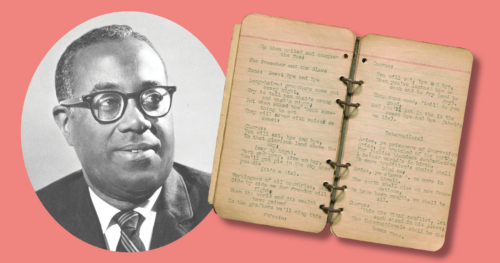New York Avenue Presbyterian Church hosts Dr. Katharine Hayhoe for an online talk heard by nearly 400 people
March 31, 2022

Dr. Katharine Hayhoe
Climate scientist Dr. Katharine Hayhoe says the most important thing we can do to fight climate change is to talk about it. That’s precisely what she did during a McClendon Scholar Program offered by New York Avenue Presbyterian Church in Washington, D.C. Nearly 400 people listened in.
Hayhoe teaches at Texas Tech University and is the chief scientist at The Nature Conservancy. Her new book is “Saving Us: A Climate Scientist’s Case for Hope and Healing in a Divided World.”
During every talk she gives, Hayhoe hears some form of this question: What gives you hope?
“Whenever we talk climate change, we always refer to it as saving the planet,” said Hayhoe. “I am here to tell you something: the planet will survive anything we do to it. The planet does not need us. We need the planet. It’s about saving us, and by ‘us’ I mean human beings, human civilization and the many things living with us.” Hayhoe made the case that in Genesis 1, God gives humans “responsibility over every living thing on the planet: plants, animals and our sisters and brothers as well.” To care about climate change, we need to be only one thing, she said: a human living on planet Earth.
To determine what gives her hope, Hayhoe first landed on what doesn’t give her hope. Two things occurred to her: science and politics, the latter of which “fails us again and again.”
“What makes me the angriest and the saddest is that 3.5 billion of the [Earth’s] poorest people are responsible for 7% of the problem,” Hayhoe said. They are already marginalized, and they’re mainly comprised of women, children and Indigenous people “living in communities suffering from racism, marginalization and injustice.”
As someone who earned two graduate degrees in the field of climate science, “if I can find hope, you can, too.”
Real hope, she said, “recognizes the risks and understands what’s at stake. It accepts that success [overcoming climate change] is not inevitable or even entirely probably. But it provides a vision of a better outcome or future.” People with hope “can grab everyone by the hand and we can take them with us in that direction.”
The science offers a bit of hope, according to Hayhoe. How warm it gets depends on how much carbon we produce. “We are the ones controlling the train. We have agency,” she said. “We have the ability to choose our future.”
The U.N.’s Intergovernmental Panel on Climate Change says that “every action matters,” Hayhoe said. “Every bit of warming, every year and every choice matters.”
When she turns the question around and asks her listeners what gives them hope, it’s children and youth, she said, followed by adult leaders and advocates, technology and innovation, changing attitudes and education. Do people expect children to fix the problem? Emphatically they tell Hayhoe no, and “that’s why we are fighting,” she reported, displaying a photo of a protest sign bearing this message: “Fight climate change or else your grandkids will curse and disown you.”
“Children are a symbol of that bright light at the end of the tunnel,” Hayhoe said. “They are a reminder that there must be a future.”
People are willing to change if they feel efficacy, she said, the belief that what they do will make a difference. “The one thing we need more than hope is action,” Hayhoe said, quoting the young climate campaigner Greta Thunberg. “Once we start to act, hope is everywhere.”
Where do we start? It’s counterintuitive, she said, but it’s not with plug-in cars or solar panels or plant-based diets. “Those are good things to do,” Hayhoe said. “But do the one thing most of us aren’t doing: talking about it. … We don’t think it matters, and we don’t think there is anything positive we can do to change it.”
Hayhoe added: “Your voice can make a huge difference. You may not know it until later, or you might never know. We use our voice to talk about why it matters and about possible practical solutions. That’s how we change the world.”
Mike Ferguson, Editor, Presbyterian News Service
Let us join in prayer for:
PC(USA) Agencies’ Staff
Debbie Miller, Assistant, Loan Operations & Investment Maintenance, Presbyterian Investment & Loan Program
Martha Miller, Manager, Ministry Education & Support, Office of the General Assembly
Let us pray
Dear God, blessed are those who add to the harmony of your world and encourage others to do the same. Thank you for drawing us into the circle of your love. Amen.









